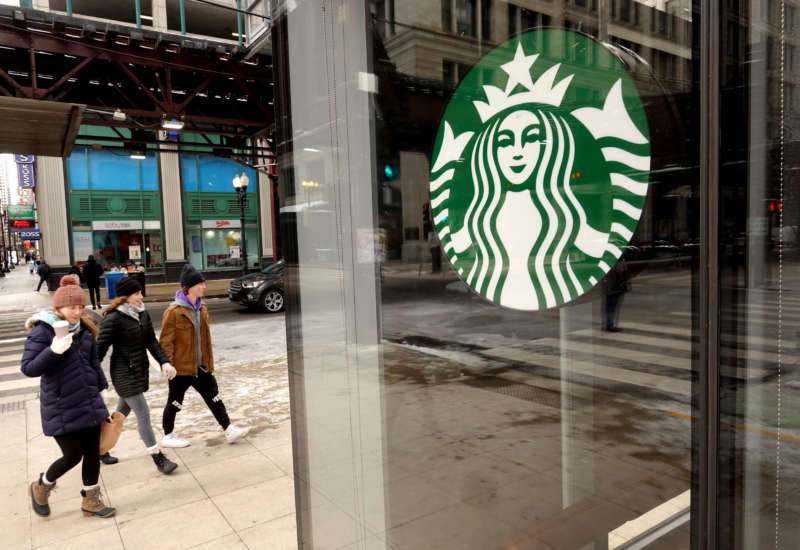Starbucks workers in Chicago, Cleveland and Eugene, Oregon, have filed to form a union, joining a wave of organizing efforts at Starbucks locations across the country just a month after workers in Buffalo successfully unionized.
According to Starbucks Workers United, workers in 29th and Willamette in Eugene, Logan and California in Chicago and 6th Street in Cleveland recently filed to unionize. If these workers are successful, they will join the Elmwood location in Buffalo in being among the first of the company’s roughly 9,000 corporate-owned locations to successfully form a union.
With the addition of these three locations, there are now approximately 16 stores that have filed to unionize, over a dozen of which have ongoing organizing efforts. Numerous stores in New York have filed, as well as stores in Seattle; Knoxville, Tennessee; Broomfield, Colorado; the greater Boston area; Mesa, Arizona; and a Wabash Avenue location in Chicago. One effort – Camp Road in Buffalo – failed, with workers voting against unionization.
Like their fellow Starbucks organizers in Buffalo, workers in Chicago, Eugene and Cleveland cited Starbucks’s own purported social responsibility in their letters to CEO Kevin Johnson announcing their unionization efforts. Workers in Eugene said that while Starbucks has taken laudable stances on social issues, it has been failing its own workers through its union-busting campaigns.
“Starbucks’ mission statement is ‘to inspire and nurture the human spirit – one person, one cup and one neighborhood at a time,’” Cleveland workers wrote. “We at store 2390 believe there is no better way for the company to fully live its mission statement than through accountability and by respecting partners’ right to unionize.”
Chicago workers expressed a similar sentiment, citing Starbucks’s “record profits” as a reason for the company to treat its workers better and allow them to organize. “For the better part of its history, Starbucks management’s relationship with its workers has been one predicated on the concept of partnership. However, without the ability to fairly negotiate wages and conditions, Starbucks and its workers can never have a true partnership,” the Logan and California Starbucks employees wrote.
The company has indeed been marking record profits, with fourth quarter profits last year exceeding pre-pandemic profits by 11 percent, according to the company. But the profits seem to come at the expense of workers, who report poor working conditions and safety concerns regarding the pandemic.
“Even while working in the midst of an ongoing health crisis, we do not feel we have been adequately cared for in terms of consistent guidelines or effective safety measures,” the Cleveland workers wrote. They also reported burnout and feeling like “cogs in a machine,” despite the company’s pledge to treat them as “partners.”
Similar complaints have been lodged by the Elmwood employees, who went on strike last week to protest what they called “unsafe working conditions” due to COVID. “Starbucks would rather let loyal employees walk than address critical issues regarding COVID,” wrote Elmwood worker and organizer Michelle Eisen. “Corporate continues to put profits over partners.”
The strike ended on Monday. Only a month ago, the Elmwood workers in Buffalo formed a union in the face of extraordinary odds, even as the company swarmed the store with executives and took other drastic steps to quell union efforts.
Recently, Starbucks took a loss in its union-busting efforts in Mesa. Last week, a regional director of the National Labor Relations Board ordered that ballots for the Mesa election only be mailed to one store, rather than being mailed out to employees across the region. In arguing against store-by-store elections, the company was attempting to dilute the vote across stores that may not have been engaging in unionization efforts, leaving them susceptible to anti-union propaganda from corporate.


